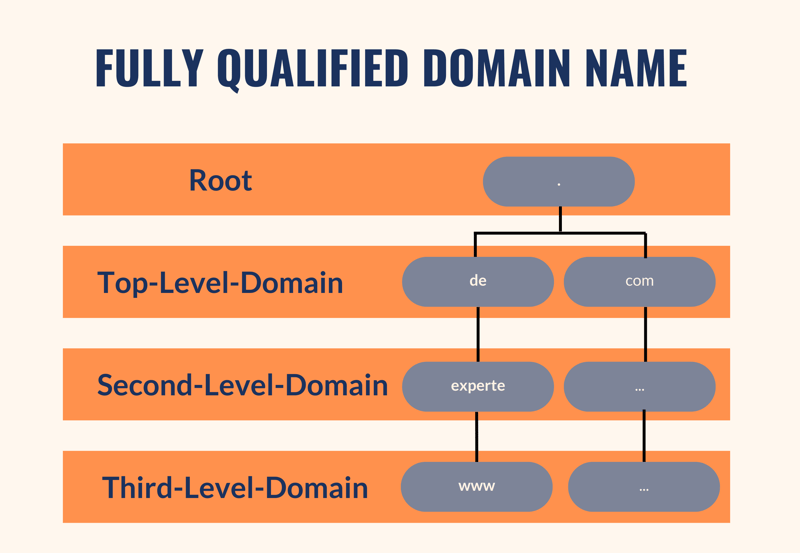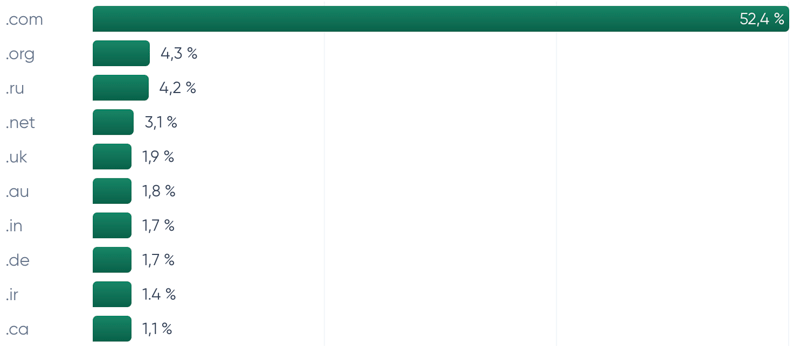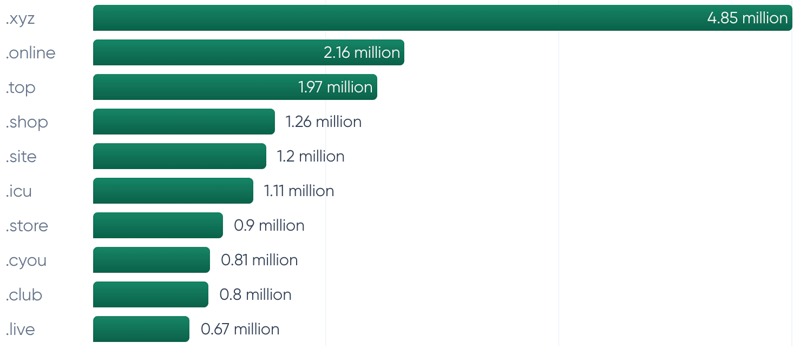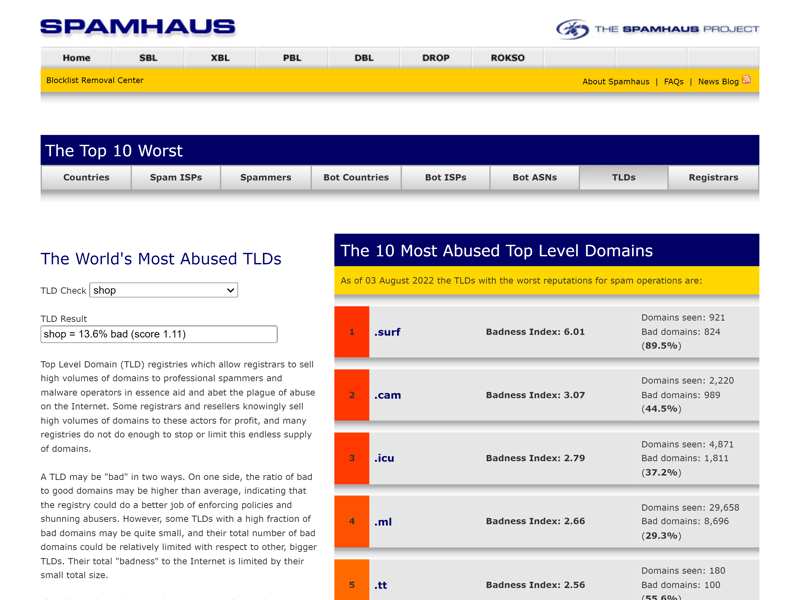Domain Extensions: Which Top-Level Domain (TLD) Should You Choose?
Have you ever input ".com", ".org", or ".net" at the end of a URL and wondered what these mean? You probably heard that ".com" stands for commercial, and ".org" for organization, but what about the others? And if creating your own website, which domain extension is best?
In this article, we'll let you know which domain extensions there are, what the most popular choices are, and provide some criteria according to which you can find the best option for you and your website.
What Is a Domain Extension?
A domain extension is the last part of a web address, namely, that which follows the period or dot. To differentiate between the other parts of the domain, it's also referred to as the "top-level domain" or TLD. But what's a domain?
Put simply, a domain is the name and address of a website online. Computers and websites are identifiable via their IP addresses, which consist of a series of numbers separated by dots, like 104.26.5.112. The only problem is that it isn't convenient to remember blocks of numbers, so each IP address for a website has a corresponding domain name. For the numbers above, this is www.experte.com.
The domain name system (DNS) is a sort of telephone directory that translates all of the IP addresses into domain names (and vice versa). So, if you type www.experte.com in your browser's address bar and press enter, that domain name will be converted into an IP address, so that you can be connected to the desired server.
Types of Top-Level Domains
Whenever a DNS converts a domain name into an IP address, the first thing it examines is the extension:

Top-level domain in the FQDN hierarchy (the so-called root label is defined as "empty" and usually doesn't appear in connection with websites).
Depending on their TLD, domains can be grouped into different categories. The Internet Corporation for Assigned Names and Numbers or ICANN is responsible for managing and classifying TLDs.
The most important kinds of TLDs are:
Country code top-level domains (ccTLDs)
These two-letter domain extensions are those which indicate and are administered by the website's country of origin, such as .us, .fr, .jp, or .de.Generic top-level domains (gTLDs)
This next type of TLD isn't applicable to a specific country but used internationally. Originally, they were intended to indicate various types of activities or businesses, but, can nowadays be used by anyone for any purpose. Examples include .com. , .info. , .net, and .org.Sponsored top-level domains (sTLDs)
sTLDs are a sub-group of gTLDs that, as their name suggests, are sponsored by organizations or interest groups and subject to their terms and conditions. The sTLD .edu can only be used by schools and universities while.gov signifies an association with the US government.New generic top-level domains (New gTLDs)
These are relatively recent gTLDs that have been introduced by ICANN since 2013. Their creation was made necessary since the existing extensions were too slow and memorable domains were desired. Among this newest generation of gTLDs are options such as .blog, .web, .shop, or .berlin.
Domain Extension List: Which Domain Extensions Are There?
Nowadays, there are more than 1,500 TLDs. Along with ICANN's types, you can also group TLDs, depending on their usage, into different categories, such as:
International Domain Extensions
Generic TLDs are particularly popular and useful the world over. Three such domains can be registered and used by anybody without restrictions:
Domain Extension | Applicability |
|---|---|
.com | Commercial offers |
.org | Organization |
.net | Internet Service Provider |
Countries and Cities
By now, you probably know that each country has its domain extension, however, you might not be aware that lots of cities have their own TLDs as well. Here are a few examples:
Domain Extension | Applicability |
|---|---|
.de | Germany (Deutschland) |
.fr | France |
.uk | United Kingdom |
.us | USA |
.berlin | Berlin |
.nyc | New York City |
.tokyo | Tokyo |
Businesses and Branches
Companies can also configure their domain name to match the branch they operate in. This gives potential customers an idea of what sort of business pages they're about to visit.
Domain Extension | Examples |
|---|---|
.biz | Businesses |
.care | Nursing |
.cab | Taxis |
.design | Design agencies and freelancers |
.app | Application websites, or developer start-ups |
Travel, Sport, and Entertainment
Travel agencies, clubs, and sporting teams can also take advantage of TLDs, such as:
Domain Extension | Examples |
|---|---|
.sport | General sport pages |
.team | Fan and team websites |
.basketball | Websites of basketball players and teams |
.game | Video game websites |
.events | Event websites |
Family and Society
You're running a dog blog or an online store specializing in children's toys? If so, it's worth taking a look at family and society domains:
Domain Extension | Examples |
|---|---|
.family | Family blogs or advice pages |
.dog | Dog blogs or stores specializing in pet products |
.dating | Dating websites |
.social | Blogs or social media |
.charity | Non-profit organizations or donation websites |
Which Domain Extensions Are the Most Popular?
There are thousands of domain endings. The popularity and spread of existing generic and country-specific domains haven't yet been reached by new TLDs, as can be seen in the most recent usage numbers (as of 2022). With almost 53%, .com remains the dominant player, with .org being a very distant second. Excluding .net, the rest of the Top 10 is composed entirely of country-specific extensions.

.com is the undisputed #1 among TLDs (Source: W3Techs).
Popular New Domain Extensions
It's unfair to compare well-established and generic domain extensions with fairly new and highly specific TLDs. For that reason, we wanted to take a closer look at which new domain extensions are the most popular. With around 5 million domains, .xyz takes first place and is actually used by Google's parent company, Alphabet (abc.xyz).

The most popular new TLD, as of June 2022 (Source: nTLDStats)
Which Domain Extension Should I Choose?
And now the million-dollar question: Which TLD is the best for your digital project? This depends on both your business and your goals. Going with a popular generic or country-specific extension is often a solid choice:
.com is by far the most popular domain extension. If your website is directed toward an international audience, this is a great choice.
.org can be a perfect option for associations or non-commercial groups.
.info is ideal for operating an informational website and building trust among your audience.
One issue with these generic domain extensions is that they're hotly contested and most good names and combinations have already been taken. You could try to get in touch with a domain's owner and attempt to purchase it from them. If that's not an option, there are alternatives, especially new TLDs.
.shop is a useful choice for online stores.
.berlin and other city TLDs are for very local websites or businesses with strong ties to a specific community.
.sport and branch-specific TLDs like .events make sense when you want to emphasize the particular branch you're doing business in.
From an SEO point of view, according to Google, you can rest easy adopting a new TLD since these are handled in the same manner as more traditional extensions. Apart from that, you'll also have more flexibility with the new domain extensions: Compared to classic TLDs, the likelihood that your preferred name is already taken is relatively slight. This allows you to be more creative and use the new domain extensions for even more memorable website addresses or wordplay.
However, you should keep in mind that lots of new TLDs aren't perceived as ambivalently as .us or .com. This is because most modern domain extensions are associated with spam or other dubious purposes. On Spamhaus, you can check the reputation of TLDs. Extensions with particularly poor reputations are .surf, .cam, and .icu.

On Spamhaus, you can find out what sort of reputation a domain extension has.
Use Multiple Domain Extensions
You don't need to settle on a single TLD, and can actually use multiple ones. This is a great way to make your website appealing to different markets. From an SEO point of view, you'll need to exercise some caution here so that you won't be penalized by search engines for duplicating content.
If you're trying to reach an international audience, it's easier to use an international domain extension like .com and prepare local versions through subdomains.
Multiple TLDs do provide enhanced flexibility and make geotargeting more accurate, both of which are great for aligning with local markets. At the same time, setting these up and managing them is a lot more work. Compounding this, the desired domain name also has to be available for each extension.
Conclusion
A domain extension, alternatively known as a top-level domain (TLD) is the last part of a domain. Depending on which branch you or your business are active in, there are a range of different TLDs to select from.
In addition to generic domain extensions like .com or .org, which can be used without restrictions, there are country-specific TLDs like .us or .de, and sponsored TLDs like .edu or .gov, which can only be used by certain institutions. Since 2013 lots of other, new domain extensions, like .shop or .blog have become available, opening doors for new businesses, groups, or freelancers.
Determining which domain extension is the best for your website project depends entirely upon what your focus is, and the availability of the domain name you'd like. Since .us- or .com websites are geared towards US and international audiences, they're readily recognizable. However, the domain name you want might already be taken or owned by someone else, which won't necessarily be the case when trying it with a newer domain extension. In turn, this allows greater flexibility and creativity.
Would you like to register a new domain? To do this, be sure to check out our EXPERTE.com domain comparison.
FAQs
A domain extension, also known as a top-level domain (TLD) is the last component of a domain. There are a variety of different domain extensions, most of which provide information about what sort of website they belong to or where it's located. Alongside generic domain extensions like .com or .org that can be used by anyone, there are also country-specific TLDs, such as .uk or .us, and sponsored TLDs like .edu or .gov, which can only be used by certain organizations or groups.
According to W3Techs, the most popular domain extensions are .com, .org, .ru, .net, .uk, .au, .in, .de, .ir, and .ca. It's important to bear in mind though that .com has a market share of 53%. Among new domain extensions, .xyz is particularly popular, followed by .online and .top.
This depends on your website, business, or project and what its focus is, as well as the domain's availability. You can't really go wrong with generic domains like .de or .com, however, the best and most creative names are likely already taken. As an alternative, you could try a branch-specific domain extension, which offers greater flexibility and choice. However, if opting for this, be sure to select a TLD with a good reputation.







